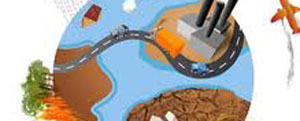
The climate change discourse has been hotly contested and debated. The battle rages on and it is no longer small talk. Lots of obstacles litter the path to adaptation and mitigation. The challenges that lie ahead are quite enormous, deeply rooted in communication failure and ideology.
Climate science remains a no-go area for the general public and lay-persons. The discourse of climate change has been commoditised and manipulated by scientists. Not that scientists are wrong, but they feel that they are the custodians of such community of practice and the butt stops at them. Despite the comprehensive knowledge, discoveries and well documented breakthroughs by scientists, climate change remains a nagging issue both environmentally and politically.
On the other hand, there lie the new breed of communicators who strongly feel that the scientists are misinforming the public. They also believe that it is their duty to help scientists translate science into manageable English. Climate change communicators argue that, communicating science to the public involves putting clear messages to the audience in nothing but plain language.
They also argue that scientists are a bit on the selfish side of communication as they speak to themselves and not the public. It appears that scientists and the climate change communicators hail from different planets altogether. Climate change communicators view the scientific jargon as a barrier to successful communication. In this view climate change communicators need to seek collaboration and symbiotic working relationship with scientists so that this communication gap can be bridged. It also remains to be seen if the scientists are of the same view lest they would take these initiatives as an invasion of their discourse community.
It is also important that these two groups of practices should not view each other in suspicious ways. Climate change communicators, on the other hand, should not view the scientists’ community as an organised lot of a disinformation campaign that is designed to confuse the public and mystify the truth. Zimbabwe at the moment lacks a unified and well-coordinated climate change family. Each one keeps the climate information to themselves.
The climate scientists and climate change communicators in Zimbabwe still remain a closely guarded secret, except for a few well-known “Mr and Mrs Climate Change Zimbabwe”. To them climate change is theirs and they are the climate themselves. This sounds quite paranoid despite the fact that climate change needs a collective effort to be managed. For many Zimbabweans, climate change still remains an elitist topic that is not for everyone but for others yet when disasters pay a visit, they sweep and cripple everyone, those in the know and those in climate slumber.
Since climate change is man-made, it also requires human solutions, scientists, climate change communicators and laypersons involved. It is everybody’s baggage to carry. If well informed climate scientists and communicators do not come out of their shells, then climate change will continue to be viewed from the Western perspective. We have our local climate issues that require local initiatives to be overcome.
The generality of Zimbabweans should, by now be able to associate the changes taking place around them with the cancer of the environment, which is climate change, legends and myths aside.
- Chamisa under fire over US$120K donation
- Mavhunga puts DeMbare into Chibuku quarterfinals
- Pension funds bet on Cabora Bassa oilfields
- Councils defy govt fire tender directive
Keep Reading
Already as the environment disintegrates before our eyes we must be able to feel pain and despondency. If we cannot feel the pain, then we become blind to what will consume us as a nation. The noble thing that we cannot take away from scientists is that, they have an exhaustive understanding of climate change. They have spent years designing successful models of predicting climate change but, above all and everything else, they need to share the information in simple ways. Climate change communicators, on the other hand, need to continue with the spirit of engaging and dialoguing with scientists so that, collectively they confront the HIV and Aids of the environment, which is climate change.
Climate change communicators should not feel hard done by climate science discourse, but should be able to meet somewhere in between. The climate is changing and we are all responsible, directly or indirectly.
Climate change information is normally powerful when cascading from the top, that is when our leaders take the initiative. It is always disheartening to note our leaders talking of climate change when a certain country has promised them money for disaster management and soon after that they become unreachable.
As leaders, they make decisions that influence our lives, but most of them are quite strangers and novices to climate change. In other progressive countries, before one is voted into office, the public would always want to know one’s climate change programme. But in our situation, it’s not surprising to find an MP or a minister for that matter who has never heard or read about climate change.
If scientists and communicators can share ideas regarding climate information, together they can work out how to co-exist in harmony amongst themselves as well as with their immediate environment. If the stand-off continues then, certainly everything we fear for will actually happen.
The era of dwelling on fatalistic logic of cutting the branch that we are sitting on should be behind us. If scientists and communicators work hand in hand, quickly and in good faith, they can arrest the time that is fast ticking and it should be yesterday. Finally, the solutions to climate change are here, with us and available to us now. It is time to change the language and change our environment.
lPeter Makwanya is a PhD candidate in Climate Change Communication at North-West University, South Africa. He writes in his own capacity. He can be contacted on: [email protected] as well as on Twitter.











